Unit 10 Where did you go on vocation1
7下Unit 10 Where did you go on vacation Period1

Did they …?
Yes,they did. / No, they didn't.
2a
Listen. Where did Nancy, Kevin, and Julie go on vacation? Match the person with the place.
Did Nancy go to Central Park?
Unit 10 Where did you go on vacation ?
Section A (1a-2c)
Lyrics(歌词) 歌词)
Yesterday Once More
When I was young I'd listen to the radio waiting for my favorite songs. When they played I'd sing along, it made me smile. Those were such happy times and not so long ago. How I wondered where they'd gone. but they're back again just like a long lost friend. All the songs I love so well.
played went went stayed did studied
My vacation
Ningbo Museum I visited Ningbo Museum on May Day.
My friends' vacation
Xiang Hua
Tom
Tina
Sally
Brad
unit 10 where did you go on vacation (说课+实录+评课+说课稿

Unit 10 Where did you go on vacation? 说课稿青白江实验外国语学校蒲婷婷学情分析学生在第九单元已接触过一般过去时,具有了学习本单元知识的认知前提,能自然地与本单元话题进行衔接。
本堂课的话题—“假期活动”接近学生的生活,学生乐于谈,有话说。
教学内容Section A中2a. 2b. 2c. Grammar focus教学目标知识与能力1.The vocabulary:New York City,Central Park,exam.2. Master and use target language:Where did you/ they /he / she go on vacation?I / They /He /She went to the mountains\New York City\beach\summercamp.Did you go to the beach?Yes,I did.No, I didn’t.How was your vacation? It was nice.情感态度价值观学会用一般过去时进行信息交流,培养学生的环保意识,热爱大自然。
教学重、难点及教学突破重点l. The vocabulary:New York City, Central Park,exam.2. Language:Where did you/they/he/she go on vacation? I/They/He/She went to the mountains/ New York City/ beach /summer campDid you go to the beach? Yes,I did. No, I didn’t.How was your vacation? It was nice.难点e the target language to talk about past events.2.一般疑问句3.Listening教学突破1.对于本课的单词短语通过图片来引出并学习。
unit 10《where did you go on vacation》第一课时课件(人教新目标七年级下)ppt.pptx

Tina
Xiang Hua
Brad
Tom
Sally
Tina
A
Xiang Hua
B
Sally
C
Brad
D
Tom
E
Yes, she did.
Did Tina go to the mountains? Yes, she did .
Did Brad go to the beach on vacation? No, he didn’t. He visited his uncle.
with the pictures[a-g]
e 1.stayed at home __
2. went to New York
city __b__
3. visited my uncle
___d__
4. went to summer
c camp _____
5. went to the
a mountains ____
Julie go on vacation? Match the person with the place.
People Places
1. c Nancy a. the beach
2. a Kevin b. home
3. b Julie
c. New York City
a guide
2b Listen again. For each question check (√)
6. went to the
f beach_____
7. visited
g museums______
PAIRWORK :
Where did he/she/they go on vacation ? He / She /They …
Unit 10 Where did you go on your vacation复习教案
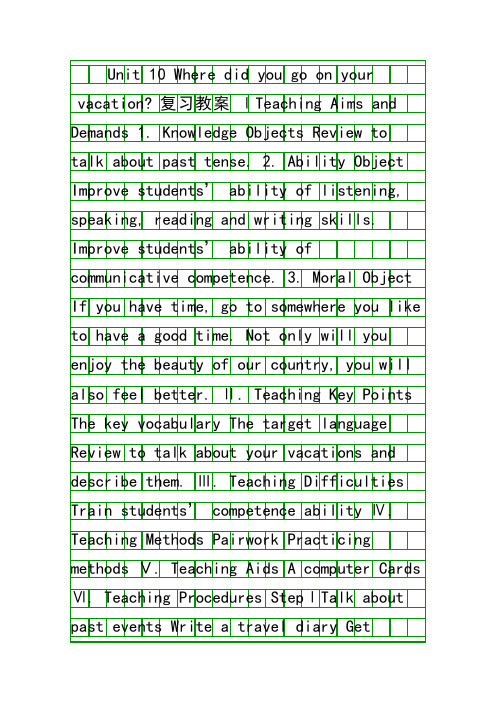
Where did you go on vacation? We went to New York. Did you go to Central Park? Yes, I did. How was the weather? It was humid.
Unit 10 Where did you go on your vacation?复习教案 ⅠTeaching Aims and Demands 1. Knowledge Objects Review to talk about past tense. 2. Ability Object Improve students’ ability of listening, speaking, reading and writing skills. Improve students’ ability of communicative competence. 3. Moral Object If you have time, go to somewhere you like to have a good time. Not only will you enjoy the beauty of our country, you will also feel better. Ⅱ. Teaching Key Points The key vocabulary The target language Review to talk about your vacations and descБайду номын сангаасibe them. Ⅲ. Teaching Difficulties Train students’ competence ability Ⅳ. Teaching Methods Pairwork Practicing methods Ⅴ. Teaching Aids A computer Cards Ⅵ. Teaching Procedures StepⅠTalk about past events Write a travel diary Get students to write their own diary on an extra piece of paper. Encourage students to use a dictionary for some new words. Get the students who finished the writing first to write his or hers in the blackboard. Correct any spelling and grammar mistakes with the students. StepⅡ Review the target language Where did you go on vacation? We went to New York. Did you go to Central Park? Yes, I did. How was the weather? It was humid. StepⅢ Review the structure Review Past tense of regular and irregular verbs: was/were. StepⅣ Review the key vocabulary Were, stayed, visited, felt, expensive, cheep, crowded, delicious After reviewed these words, then have a dictation. StepⅤ Summary Summary the target language we’ve reviewed in this unit. StepⅥ Homework Review the target language and the key words in this unit. Blackboard Design
Unit-10-Where-did-you-go-on-vacation教学演示

the Great Wall
the Palace Museum
Where did my friends go on vacation?
Tian’an Men Square
a Beijing Hutong
Task 2 My classmates’ vacation
Listen to Vera talking about her vacation. Where did Vera go on vacation? Did Vera like her vacation?
Jim
… …
…
Task 3 Decide on next vacation destination.
• I decided to go to Hong Kong. • Mary went there last summer vacation.
The weather there was sunny, warm and humid. The food was delicious. I love it. • I think it was very great. • So I want to go there next vacation.
Unit 10 Where did you go on vacation?
Leading in
Listen and answer: • What did they talk about? • What did they do on vacation?
Task 1 Talk about your vacation activities.
Listening
What does Vera think about?
七年级英语下册-Unit-10-Where-did-you-go-on-vacation----一课

She They
went to the beach visited museums
went to summer camp
went to the mountains
went to summer camp
Where did … go on vacation?
went to New York City
went to the beach
1. Review and recite the key phrases and the dialogue.
2. Preview the new lesson.
Exercises
Match the sentences. Draw a line.
1. He went to summer
a. at home .
Suzhou
The End
Vacation Survey
Name Place
Activity
Miss Shen Shanghai visited friends
Sentences you need:
Where did you go on vocation? What did you do?
Homework:
b 7. visited museums
d
Where did you/he/she/they go on vacation?
stayed at home
I
went to New York City
We
visited my uncle
You
on vacation.
He
went to the mountains
2. I visited
Unit_10_Where_did_you_go_on_vacation_单元练习1
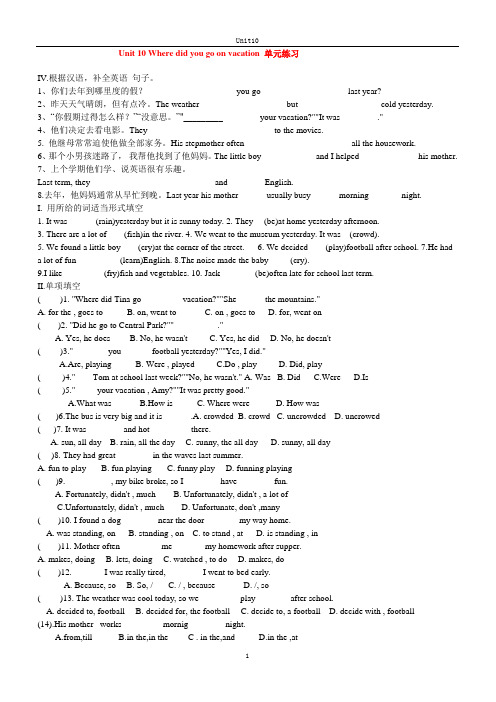
Unit 10 Where did you go on vacation 单元练习IV.根据汉语,补全英语句子。
1、你们去年到哪里度的假?_________ _________you go _________ _________last year?2、昨天天气晴朗,但有点冷。
The weather_________ _________but _________ ________cold yesterday.3、“你假期过得怎么样?”“没意思。
”"________________your vacation?""It was ________."4、他们决定去看电影。
They__________ _________ _______to the movies.5. 他继母常常迫使他做全部家务。
His stepmother often ______ _______ ________all the housework.6、那个小男孩迷路了,我帮他找到了他妈妈。
The little boy_____ ______and I helped ____ ______ his mother.7、上个学期他们学、说英语很有乐趣。
Last term, they______ ________ ___________and ________English.8.去年,他妈妈通常从早忙到晚。
Last year his mother ______usually busy ______morning _______night.I. 用所给的词适当形式填空1. It was ______(rain)yesterday but it is sunny today.2. They __(be)at home yesterday afternoon.3. There are a lot of____(fish)in the river.4. We went to the museum yesterday. It was__(crowd).5. We found a little boy____(cry)at the corner of the street.6. We decided____(play)football after school.7.He hada lot of fun__________(learn)English. 8.The noise made the baby_____(cry).9.I like _________(fry)fish and vegetables. 10. Jack________(be)often late for school last term.II.单项填空( )1. "Where did Tina go _________vacation?""She ______the mountains."A. for the , goes toB. on, went toC. on , goes toD. for, went on( )2. "Did he go to Central Park?""__________."A. Yes, he doesB. No, he wasn'tC. Yes, he didD. No, he doesn't( )3."________you_______football yesterday?""Yes, I did."A.Are, playingB. Were , playedC.Do , playD. Did, play( )4."____Tom at school last week?""No, he wasn't." A. Was B. Did C.Were D.Is( )5."_____your vacation , Amy?""It was pretty good."A.What wasB.How isC. Where wereD. How was( )6.The bus is very big and it is ______.A. crowded B. crowd C. uncrowded D. uncrowed( )7. It was ________and hot _________there.A. sun, all dayB. rain, all the dayC. sunny, the all dayD. sunny, all day( )8. They had great ________in the waves last summer.A. fun to playB. fun playingC. funny playD. funning playing( )9. __________, my bike broke, so I ________have ________fun.A. Fortunately, didn't , muchB. Unfortunately, didn't , a lot ofC.Unfortunately, didn't , muchD. Unfortunate, don't ,many( )10. I found a dog ________near the door________my way home.A. was standing, onB. standing , onC. to stand , atD. is standing , in( )11. Mother often _________me _______my homework after supper.A. makes, doingB. lets, doingC. watched , to doD. makes, do( )12. _______I was really tired, ________I went to bed early.A. Because, soB. So, /C. / , becauseD. /, so( )13. The weather was cool today, so we _________play________after school.A. decided to, footballB. decided for, the footballC. decide to, a footballD. decide with , football(14).His mother works _________mornig ________night.A.from,tillB.in the,in the C . in the,and D.in the ,at(15).They arrived there ______5:00______a cold morning A.at,in B .on,at C.at,on D.on,inIII.按要求进行句型转换。
Unit 10 Where did you go on vacation?

S ew n h u ti.她 去爬 山 了。 h e tt temo nan o
we hr e疑问 副词 , 来 询 问地 点。一 般 过去 用
时 的 特 殊 疑 问 句 由疑 问 词 +一般 疑 问 句 。
2 ~ wh r i h oo aain . eedds eg n v ct ?她 在 哪 儿 o 度假?
sev idhr nl.她去拜访她 的叔叔 。 h it e c se u e
v iv it .参 观 , s 拜访 v is.拜 访 某 人 it b s
Io e ii my ga d i v c t n. f n vst rn ma Ol a a i t o
这学期我们高兴的学英语 。
5. es o swe e to co d.o Iddn tr al Th h p r o rwc s i e l y
假期 , 要注意时态。
ej .这些 商店太拥 挤 了 , 以我真 的不 喜欢 n yi o t 所
【 耐优化精解】 敦i
发现一个小男孩在角落里哭 。
fn o d的原 形 是 f d u i n
我常常在假期拜访我 的外婆 。
v is.参 观 游 览 某 地 it p s
D o at ov iB in?你想 去参观 北京 o uw n t it ei y s j g
吗so 1 游客
U i1 ee i y ug n aain n 0 Wh r d o oo ct ? t d v o
同步 点 拨
【 学习目标导航】
1 .会 向 同伴 询 问过 去 的情 况 。
一
T ee aca lto ii r n o rcu t v r er h r r o fvs osi u o ny e eyy a. t
Unit_10_Where_did_you_go_on_vacation电子教案1
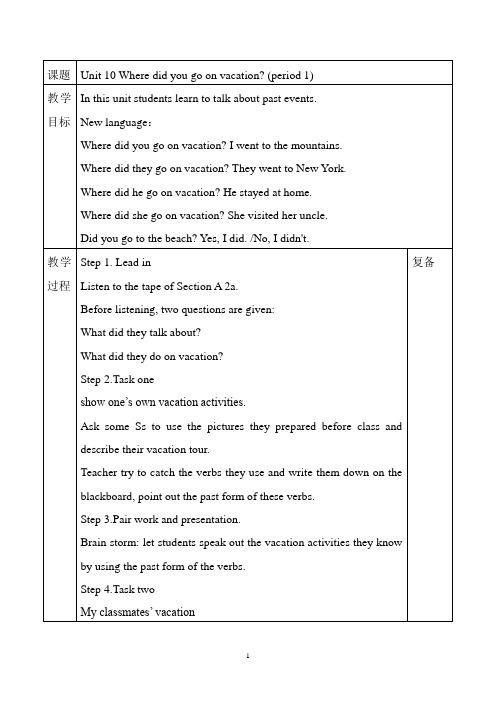
2. Review the difference between regular –ed past tense verbs (stay –stayed, visited).
Brain storm: let students speak out the vacation activities they know by using the past form of the verbs.
Step 4.Task two
My classmates’ vacation
Listen to the tape of Section B2a,ab.
step 5. Listening
This activity gives students practice in understanding the target language in spoken conversation.
The people talk about what they did on vacation.listen to the recording and write numbers of the names in the right boxes in the picture. Please write only 5 numbers. Point out the sample answer next to the picture showing went to the mountain.
Where did they go on vacation? They went to New York.
Unit-10-Where-did-you-go-on-vacation-Section-A--新目标

Where did you go on vacation?
visited museums
Where did Brad go on vacation? He visited his uncle.
Where did Tom go on vacation?
He went to summer camp.
Fill in the blanks in the conversation. Use “was” or “were”. Example: It was rainy. The mountains were beautiful.
Amy: How was your vacation, Lin? Amy: How
Where did Sally go on vacation?
She stayed at home.
Where did Tina go on vacation?
She went to the mountains.
Where did Xiang Hua go on vacation?
He went to New York City.
Did you … Nancy go to Central Park? Kevin
Yes, I did
No, I didn’t
√ √ √
play volleyball?
swim? go to the movies? study for exams?
Julie
√
√
GROUPWORK
Nancy, where did you go on vacation? I went to Now York City. Oh, really? Did you go to Central Park? Yes, I did.
人教版七年级英语《Unit.10.Where.did.you.go.on.vacation》教案

Unit 10 Where did you go onvacation?Topic: Holidays and vacationsFunctions: Talk about past eventsStructures:Past tense of regular and irregular verbswas / wereHow questionsTarget language: Where did you go on vacation?We went to New York City.Did you go to Central Park?Yes, I did.How was the weather?It was humid.Teaching StepsPeriod 1Good morning everyone! We have finished Unit 9. Today we are going to learn a new unit—Unit 10.Step 1: Lead inAsk and answera. Can you tell me what the title of Unit 10 is? Yes, it’s Where did you go on vacation? What do you think the unit is about?b. Yes. In this unit we are going to talk about past events.Step 2: Section A 1aIn Unit 9, we talked about the recent past activities and in this unit, we are going to continue talking about the past events.First, please open your books at Page 59 and look at activity 1a.1. Look and findLet’s look at activity 1a and find what the phrases mean.2. MatchYou know what the phrases mean. Please match them with the pictures.3. Check the answersHave you finished? Let’s check the answers one by one.Answers: 1. e 2. b 3. d 4. c 5. a 6. f 7. g4. Reada. Please read the phr ases after me. Stayed at home …b. Let’s read them together.c. Would you please read them one by one?Step 3: Section A 1b1. Listen and numberListen to the tape. And number the people from 1 to 5 in the picture. 2. Check the answersLet’s check the answers.Answers: 1. went to the mountains2. visited my uncle3. stayed at home4. went to New York City5. went to summer camp3. Reada. I would like you to read the conversations together.b. Would you please read them by yourselves three times?c. This time I would like you to read them twice with your partner.d. Who would like to read in class?Step 4: Section A 1cPairwork1. ReadWould you please read the conversation in 1c with your partner?2. Practicea. Would you please make conversations with your partner to talk about where the people went on vacation in activity 1a?b. Who would like to have a try in class?Step 5: Section A 2a1. ListenNow class, let’s move to activity 2a now. Please listen to the tape for the first time.2. MatchWhere did Nancy, Kevin and Julie go on vacation? Please match the person with the place when you listen to it for the second time.3. Check the answersHave you finished? Please check your answer with your partner and see whether your answers are the same. Let’s check them together.Answers: 1. c 2. a 3. bStep 6: Section A 2b1. Listen and checka. Listen to the conversation for the first time.b. Please check (√) “Yes, I did.” or “No, I didn’t.” for each question as you hear them talk.2. Check the answersHave you finished? Let’s check them.Answers: go to Central Park? Yes, I did.play volleyball? No, I didn’t.swim? Yes, I did.go to the movies? No, I didn’t.study for exams? Yes, I did.3. Reada. Let’s read the conversations together.b. I would like you to read them by yourselves.c. Who would like to have a try to read them in class?Step 7: Section A 2cGroupworka. Now class, let’s move to activity 2c.It’s a groupwork. Would you please role play conversations between Nancy, Kevin, and Julie?b. Who would like to have a try in class?c. Well done. Please pay attention to the past forms of the verbs in the phrases.Step 8: Grammar Focus1. ReadRead the sentences in the grammar box.2. Point out the notesSimple past tense Regular verbs Irregular verbsStep 9: SummarizeLet’s summarize what we learnt in this period.Step 10: Homework1. Copy the words in activity 1a and the sentences in the grammar box.2. Practice activity 2a and 2b.Period 2Step 1: Lead inWhat did we learn in Period 1? Who can tell us? Yes. We got to know how to talk about past events. Besides them, we learnt some regular verbs and some irregular verbs. Do you still remember how to say them? OK. Let’s review them first.Step 2: Revision1. Ask and answera. Would you please translate my Chinese into English? 拜访我的舅舅、参观博物馆……b. Please practice in pairs. Student A says in Chinese and student B translates it into English.2. DictationPlease take out your dictation exercise books and let’s have a dictation.Step 3: Section A 3a1. FillNow, let’s move to a new part of lessons. Would you please look at activity 3a on Page 61? Fill in the blanks with “was” or “were” in the c onversation.2. Check the answersI think all of you did well.Answer: 1. was 2. was 3. were 4. were 5. was 6. was 7. were 8. were3. Reada. Read the conversation with your partner.b. I would like you to read it together.c. Would you like to read it in class? Please have a try.4. Explainpretty good fantastic unfriendlyStep 4: Section A 3bPairworka. Just now, we learnt how to ask about the vacation. Now, I would like you to do a pairwork to ask and answer questions about the people’s vacations in 3b. Please follow the example in 3a.b. Who would like to have a try in class?Step 5: Section A 4Game—Vacation albumJust now, we talked about some people’s vacations. How about your vacations? Please make a photo album of vacations you enjoyed. Show the album to your classmates and talk about your vacations.Step 6: SummarizeLet’s summarize what we learnt in this period.Step 7: HomeworkCopy and try to recite the conversation in 3a.Period 3Step 1: Lead inGood morning, boys and girls. Shall we continue our lessons? Could you please tell me what we learnt in Section A? Yes. We learnt to talk about the weekend.Step 2: RevisionReviewa. I will show you some pictures and some information and please make conversations.b. Let’s have a dictation.Step 3: Section B 1a1. Looka. In Section A, we talked about the vacations with some description words. In Section B, we are going to learn more description words.b. Open your books at Page 62. Would you please look at activity 1a?c. Look at the words and the pictures.2. MatchPlease match the words with the pictures.3. Check the answersHave you finished, everyone? Let’s check them together.Answers: 1. f 2. a 3. d 4. e 5. b 6. cStep 4: Section B 1b1. WriteLet’s move to activity 1b. Do you think the words in 1a are happy words or unhappy words? Write happy words on the left and write unhappy words on the right.2. Check the answersCheck the answers with your friends.Answers:Happy words: delicious, cheap, not crowdedUnhappy words: awful, expensive, crowdedStep 5: Section B 2a1. Listen and answera. Let’s move to activity 2a now. It is a listening exercise. For the first time, I would like you to listen only.b. Now, for the second time, please listen to it again and answer the questions in activity 2a.2. Check the answersI think most of you have finished it. Let’s check them together.Answers: 1. She went to Tokyo.2. Yes, she did.Step 6: Section B 2b1. ListenListen to the conversation for the first time.2. Listen and filla. Listen to the conversation again and fill in the chart.b. Listen to the conversation again and check them by yourselves.3. Check the answersLet’s check the answers together.Answers: vacation: greatmuseums: interesting, crowdedstores: expensivepeople: friendlyfood: delicious4. Read the tapescripta. Let’s read the tapescript together.b. Would you please read the tapescript in pairs?c. Please translate the conversation into Chinese in pairs.d. Who would like to read in class?Step 7: Section B 2cPairworkRole play. Student A is Vera’s friend. Student B is Vera. Talk about Vera’s vacation. Use the information in the chart above. Student A begins questions with these words: Where did …? What did …? Did you …? How was …? How were …?Step 8: SummarizeLet’s summarize what we learnt in this period.Step 9: HomeworkPractice activity 2a and 2b in Section B.Period 4Step 1: Lead inWe have finished the most part of Unit 10. And in this period, we will continue to finish Section B. But before that, I would like you to review what we learnt before.Step 2: Revisions1. Make a speechCan you make a speech according to the chart to tell us your vacation?2. DictationLet’s have a dictation.Step 3: Section B 3a1. Reada. Let’s go into activity 3a on Page 63. There is a diary from Bob.b. Please read it by yourselves. If you have any questions, please ask me.c. I would like you to read it together.2. Circle and underlinePlease circle the good things about his vacation and underline the bad things.3. Check the answersI think most of you have finished. Please check your answers with your partner.Answers:Circled items: the weather (great)the beach (beautiful)playing in the water (fun)helping the little boy find his father (happy)playing tennis (really fun)eating Sichuan food (delicious)Underlined items: shops were too crowded (didn’t really enjoy them)museum (kind of boring)no money for taxi / walking back to hotel (tired)4. ExplainLet me explain some key words and phrases to you.all day have a fun doing sth. be crowded kind of find sb. doing sth. be lost help sb do sth. make sb. do sth. walk back to decide to do sth. all morning for dinnerStep 4: Section B 3b1. WriteImagine you are an American student on vacation in Beijing. Would you please write a travel diary according to the pictures given below?2. Reada. Please read your diary to your partner.b. Who would like to have a try to read it in class?Step 5: Section B 4GroupworkImagine you are all foreigners on vacation in China. You meet each other at the airport on your way home. Talk about what you did on your vacation.Step 6: SummarizeLet’s summarize what we did in this period.Step 7: HomeworkTry to recite the article in 3a.Period 5Step 1: Lead inWe have spent four periods on Unit 10. This is the last period of Unit 10. In this period, we will do some exercises and make sure you learn this unit well.Step 2: Self-check-11. Check the words and the phrases you knowOpen your books and look at Self-check-1. If you know the words and the phrases well, please check them.2. ReadI would like all of you to read the words and the phrases together.Step 3: Self-check-21. Do you have any other words you don’t know? Please write them in your exercise books.2. Please ask your friends for help.3. Looking up the dictionary is also a good way to study English. I hope you can get more from dictionaries.Step 4: Self-check-31. CompleteLet’s move to Self-check-3 now. First, I would like you to complete the form below.2. Make a surveya. Make questions about vacations. Write some questions about vacations.b. I would like you to ask your partner the questions you write and write down their answers.c. Discuss the best place for a vacation with your classmates.3. WriteWrite a report on student s’ vacations.Step 5: SummarizeLet’s summarize what we did in this period.Step 6: Homework1. Do the exercises on the Students’ Book and the textbook.2. Review Unit 10.3. Watch the pictures in Just for fun on Page 64.这份文件是人教版七年级英语《Unit 10 Where did you go on vacation?》的教案,主要涵盖了五个教学周期(Period)的内容,每个周期都详细规划了教学目标、教学活动、教学方法以及课后作业。
Unit_10_Where_did_you_go_on_vacation说课稿

Unit 10 Where did you go on vacation? Section B 3a-4 说课稿Hello, everyone. I’m very pleased to have an opportunity to share some of my teaching ideas with you. The topic of this unit is Where did you go on vacation taken from Unit 10 in Go for it ( Grade Se ven students’ book 2). Today I will focus on the second period of Section B and I want to talk about the lesson from six parts.Part One: Analysis of the teaching material1. Status and functionIn Unit 10 we will continue to learn more about the Simple Past Tense and this period is mainly based on reading and writing which is a really important part in this unit. The students will be asked to have a further understanding about the tense after they have some proper practice. What’s more, the students are su pposed to not only master the grammar well, but also improve their abilities of reading and writing.2. Teaching aimsThere are three teaching aims in this period. First, students will learn to master some reading strategies. Next, students will infer the meanings of some new words while reading. Then, students will know how to write a travel diary. Finally, students will be able to express their own ideas about vacation.3. Teaching key points and difficultiesDuring this period the students need to master the key points below: First, review the Simple Past Tense and some adjectives learned in the last lesson. Second, Try to understand the whole passage by using some reading strategies. Third, learn to write a travel diary according to their own vacation. However, they will probably meet some difficulties. The teacher should pay more attention to the proper reading strategies, with which the students can find some important information in the passage.Part Two: Analysis of the studentsStudents of Grade Seven are interested in English and they would like to show their ideas to others, too. They prefer to talk about the things which are familiar in their daily life. More pictures and flashes can also help to raise their interest and make them more creative. The topic of Unit 10 is “vacation”, which is related to our daily life, so it is easy and helpful to raise the students’ learning interest. Most students will be able to talk about their ownvacations with the help of the teacher. Also they will be glad to share the ideas with their partners.Part Three: Teaching methods and reading strategiesIn this period, I’ll try to use these methods, such as communicative teaching method, task-based teaching method and audio-visual teaching method. While reading, I’l l help the students to understand the passsage by using centain reading strategies, such as scanning, reading for meaing not for details and so on.Teaching equipment: Multi-media computer, Tape recorder and the blackboard will be needed in this lesson.Part Four: Teaching ProceduresStep One: Lead-inGreeting and self-introductionArouse the students’ interest by showing them some photos about my 3-day vacation in Hangzhou during Spring Festival.1. Ask the students to describe the photos by using the adjectives they learned before.(Purpose: Help the students to review these adjectives and the target language “ How was/ were…?)2. Show my travel diary to the students.(Purpose: Let the students know what a travel diary is.)Step Two: Reading1. Read Bob’s travel diary and answer this question: It was a ___-day vacation.(Purpose: Students are supposed to find the useful information “the date”.)2. Read the diary again and find the adjectives.(Purpose: The students are supposed to find the adjectives and put them into different blanks.)3. Read a third time and fill in the chart.(Purpose: The students are supposed to find the supporting details while reading. )4. Fill in the blanks.I had a _____-day vacation. On the first day, it was _____ and _____ all day. We went to a beautiful _____ and had fun playing in the _____. Then we went shopping, but the shops were _____. On _____, we went to a _____ because it was _____. I found a small boy _____ in the _____. He was lost and I helped him _____ his father. That _____ me _____ very happy. I _____ _____ to the hotel because I didn’t have any money for a taxi. On the last day, we _____ to play tennis and it was fun. We had Sichuan food for dinner and it was _____.(Purpose: The students are supposed to retell Bob’s travel diary by completing the passage after understanding the whole story.)Step Three: Discussion and Writing1. Introduce some places of interest in Beijing.T: China is more and more popular all over the world and many foreign visitors come to visit China. Beijing is the capital of China and there are many places of interest there.(Purpose: The students are supposed to know some places, such as the Great Wall, the Palace Museum, Tian’an Men Square and Beijing Hutong,)2. Role play: Interview a foreign visitor.One student is supposed to be an American student who is on vacation in China and the other student plays a reporter from CCTV. Then make a conversation like this:(Purpose: The students are supposed to make a comversation to go over those target languages, such as “ what”, “where”, “how” and so on. And they can also discuss with each other about how wo describe these famous places. )3. Writing: Learn to write a travel diary.The teacher can give some key words and then let the students choose two of the pictures and try to write a travel diary as an American student.(Purpose: First, the students use the Simple Past Tense to make a conversation. The, Change the oral practice into written exercise. Based on the discussion ahead, it will be easier for the students to write a travel diary. In this way, every student can improve their speaking and writing abilities.)4. Composition appraise(Purpose: Revise some studen ts’ diaries and correct some mistakes.)Step Four: Homework: Write a travel diary about your 2-day vacation.Part Five: Design of the blackboard1. Title: Unit 10 Where did you go on vacation? Section B 3a-42. Some new words: cry—cries, make—made, feel—felt, water, corner, walk, decide, back3. Some places of interest: the Great Wall, the Palace Museum, Tian’an Men Square, Beijing Hutong Part Six: Reflection1. I want to raise the students’ interest, so I made the lesson begin with my own traveling experience and choose a famous city—Hangzhou.2. I want to make the reading easier for the students, so I planned some stratified questions and also use different forms.3. I want the writing to seem easy for the students, so I gave them a model and let them makea conversation first.4. I want to improve the students’ speaking, listening, reading and writing abilities, so I designed some relevant practice in this lesson.5. I want the students to use the language more often in their daily life, so I left a writing homework to them and wanted them to talk more about themselves.。
【范文】Unit 10 Where did you go on vacation-(新目标七下英
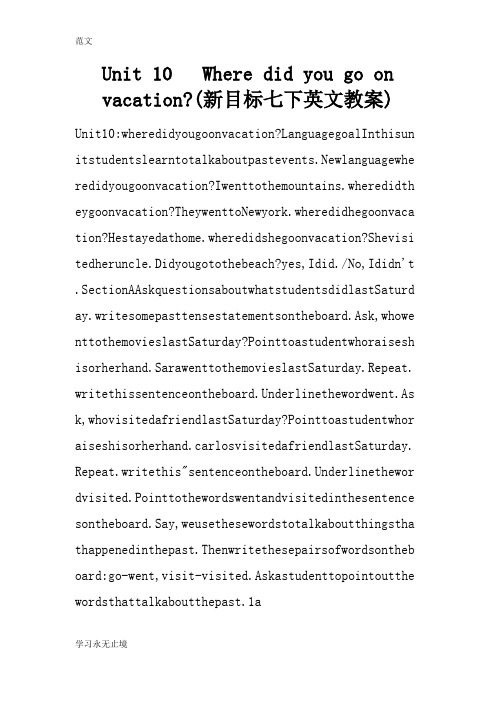
Unit 10 Where did you go onvacation?(新目标七下英文教案) Unit10:wheredidyougoonvacation?LanguagegoalInthisun itstudentslearntotalkaboutpastevents.Newlanguagewhe redidyougoonvacation?Iwenttothemountains.wheredidth eygoonvacation?TheywenttoNewyork.wheredidhegoonvaca tion?Hestayedathome.wheredidshegoonvacation?Shevisi tedheruncle.Didyougotothebeach?yes,Idid./No,Ididn't .SectionAAskquestionsaboutwhatstudentsdidlastSaturd ay.writesomepasttensestatementsontheboard.Ask,whowe nttothemovieslastSaturday?Pointtoastudentwhoraisesh isorherhand.SarawenttothemovieslastSaturday.Repeat. writethissentenceontheboard.Underlinethewordwent.As k,whovisitedafriendlastSaturday?Pointtoastudentwhor aiseshisorherhand.carlosvisitedafriendlastSaturday. Repeat.writethis"sentenceontheboard.Underlinethewor dvisited.Pointtothewordswentandvisitedinthesentence sontheboard.Say,weusethesewordstotalkaboutthingstha thappenedinthepast.Thenwritethesepairsofwordsontheb oard:go-went,visit-visited.Askastudenttopointoutthe wordsthattalkaboutthepast.1aThisactivityintroducesthekeyvocabulary.Focusattenti ononthepicture.Askstudentstotellwhattheysee.Say,Eac eacha ctivityandaskstudentstorepeat:wenttothemountains,we nttoNewyorkcity,wenttosummercamp,visitedmyuncle,sta yedathome,wenttothebeach,andvisitedmuseums.Pointout thenumberedlistofactivities.Sayeachoneagainandaskst udentstorepeat.Thenaskstudentstomatcheachphrasewith oneofthepictures.Say,writetheletterofeachpicturenex ttothenameoftheactivity.Pointoutthesampleanswer.che cktheanswers.1bThisactivitygivesstudentspracticeinunderstandingthe targetlanguageinspokenconversation.Pointtothepictur e.Askstudentstotellwhatthepersondidineachscene.Fore xample,TinawenttothemountainsorShewenttothemountain s.Playtherecordingthefirsttime.Studentsonlylisten.P laytherecordingasecondtime.Thistimesay,Therearethre econversations.Thepeopletalkaboutwhattheydidonvacat ion.Listentotherecordingandwritenumbersofthenamesin thewhiteboxesinthepicture.Pleasewriteonlyfivenumber s.Pointoutthesampleanswernexttothepictureshowingwenttothemountains.correcttheanswers.1cThisactivityprovidesguidedoralpracticeusingthetarge tlanguage.Pointouttheexampleconversation.Asktwostud entstoreadthedialoguetotheclass.Say,Nowworkwithapar tner.makeyourownconversationsaboutthepictures.Sayth edialogueinthepicturewithastudent.Doasecondexample, ifyouwish.Thenhavestudentsworkinpairs.Astheytalk,mo vearoundtheroommonitoringtheirwork.offerlanguageorp ronunciationsupportasneeded.2aThisactivitygivesstudentspracticeinunderstandingthe keyvocabularyinspokenconversation.Pointtothethreepe ople'snamesandreadthenamestotheclass.Pointtothethre evacationactivitiesandaskastudenttoreadtheactivitie stotheclass.Say,Thisisarecordingaboutthreepeople'sv acations.Pleasematchthepeoplewiththeplacestheywentt oonvacation.Playtherecordingthefirsttime.Studentson lylisten.Playtherecordingasecondtime.Thistime,askst udentstowritethelettersofwherepeoplewentonvacationn exttotheirnames.Pointoutthesampleanswernexttoitem1. correcttheanswers.2bThisactivityprovidesmorelisteningpracticeusingtheta rgetlanguage.callattentiontothechart.Askastudenttor eadthroughthenamesandactivitieslisted.Say,Nowlisten totherecordingagain.Thistime,pleaselistentotheconve rsationsandputacheckmarkinthe"yes,Idid."or"No,Ididn 't."blankaftereachactivity.|Playtherecordingthefirsttime.Studentsonlylisten.Po intoutthesampleanswerunderyes,Ididinthefirstblankaf terthewords"Nancy...gotocentralPark?"Say,DidNancygo tocentralPark?yes,shedid.Playtherecordingagain.Asks tudentstoputcheckmariflinthecorrectblanks.2cThisactivityprovidesguidedoralpracticeusingthetarge tlanguage.Say,Getintogroupsofthree.oneofyouwillbeNa ncy,onewillbekevin,andonewillbejulie.Askeachotherab outthevacations.youcantalkabouttheactivitiesfromthe chartin2boraboutanyotheractivitiesyoulike.Asstudent stalk,movearoundtheroom,monitoringtheconversationsa ndofferingsupportasneeded.youmaywanttohaveagroupofstudentspresenttheirconversationtotheclass.3aThisactivityprovidesreadingandwritingpracticeusingt hetargetlanguage.Pointoutthepicturesinthephotoalbum .Askstudentstodescribewhattheysee.Afterthat,readthe firsttwolinesofthedialoguetotheclass.Pointouttheans werwasinthefirstline.Thenpointouttheblanksintherest ofthelinesofthedialogue.Readtheconversationtothecla sssayingthewordblankforeachblankline:Howblankthebea ches?Thensay,writethewordwasorwereineachblank.Askst udentstocompletetheactivityontheirown.correcttheans wers.3bThisactivityprovidesguidedoralpracticeusingthetarge tlanguage.Pointtoeachofthepicturesandaskstudentstos aywhattheysee.Thenreadthewordsundereachpicture.Pron ounceanynewwordsandexplainwhattheymean,ifnecessary. Forexample,Inthispictureagirlisonabus.Thegirlistaki ngabustrip.Ask,whatdoesrelaxingmean?Doesitmeanyouar eexcitedorquiet?Howdoyoulookwhenyourelax?Ifstudents don'tknowthemeaningofrelaxing,demonstratebyleaningb ackinyourseatandhalf-closingyoureyes.Say,Nowworkwithapartner.makeyourownconversationsaboutthepictures. Sayadialoguewithastudent.Pointtothefoodpicture.Ask, Howwasthefood?Thestudentreplies,Itwasawful.Doasecon dexample,ifyouwish.Thenhavestudentsworkinpairs.Asth eytalk,movearoundtheroommonitoringtheirwork.offerla nguageorpronunciationsupportasneeded.4.Thisactivityprovidesspeakingpracticeusingthetargetl anguage.Explaintothestudentsthattheyaregoingtomakea vacationphotoalbumandtalkaboutitwiththeirclassmates .youmaywanttoprovidestudentswithmagazineswhichtheyc ancutupfortheirphotoalbums,oraskthemtodrawthephotos orhavethemmaketheirphotoalbumsathomeforhomework.onc estudentshavecompletedtheirphotoalbums,drawstudents 'attentiontothevacationpicturesinthestudentbook.Tel ingt hesimplepasttense,pointtoeachpictureanddescribeafew thingsaboutyourtimeineachplace.writewh-questionsont heboard.Remindstudentsthatthephotosinthebookinactiv ity4arephotosfromyourvacation.Encouragetheclasstoas kyouwh-questionsaboutyourvacation.Havestudentsinter viewtheirclassmatesabouttheirvacationphotoalbums.whenstudentshaveinterviewedseveralclassmates,havethem discussinpairswhereinchinatheythinkwouldbethebestpl aceforavacation.Itcouldbesomewhereoneofthemhasbeent o,orjustsomewheretheyhaveheardofandwouldliketovisit .Haveseveralpairsexplaintheirchoicesofvacationdesti nationtotherestoftheclass.SectionBNewlanguagedelici ous,awfulexpensive,inexpensivecrowded,uncrowded1aThisactivityintroducesmorekeyvocabulary.Pointoutthe sixwords.Sayeachwordandaskstudentstorepeatit.callat tentiontothefirstpicture.Say,Thisisaring.Thepriceis onehundredmilliondollars.It'sexpensive!Dothesamethi ngforallsixpictures'.Thenpointouttheblanklineinfron tofeachnumberedword.Askstudentstomatcheachwordwitha picturebywritingtheletterofeachpictureintheblankinf rontofthecorrectword.Pointoutthesampleanswer.Asstud entswork,movearoundtheroomansweringquestionsasneede d.1bThisactivityprovideswritingpracticeusingthetargetla nguage.Pointoutthesmileyfaceandthefrownyface.Say,Th esmileyfaceisforgoodthings.Thefrownyfaceisforbadthings.callattentiontothesixwordsinactivityla.Say,Noww riteeachwordunderthesmileyfaceorunderthefrownyface. Pointoutthesampleanswer.Say,Theworddeliciousisunder thesmileyfacebecausedeliciousisahappyword.Askstuden tstofinishtheactivityindividually.checktheanswers.2 aThisactivitygivesstudentspracticeinunderstandingthe targetlanguageinspokenconversation.Say,Nowlistentot hisconversation.Veraistalkingabouthervacation.Point outthetwoquestions.Say,Afteryouheartheconversation, pleaseanswerthesequestions.Readthequestionstothecla ss.Playtherecordingthefirsttime.Studentsonlylisten. Playtherecordingasecondtime.Thistimesay,Listentothe recordingandwritetheanswertoeachquestion.correctthe answers.2bThisactivityprovidesfurtherlisteningpracticeusingth etargetlanguage.callattentiontothechart.Readtheword sinthecharhervacation,themuseums,thestores,thepeopl e,thefoaSay,Listentotherecordingagain.Thistime,writ ewhatVerathinksaboutthesethingsintheblanksiithechart.Pointoutthesampleanswer.Say,whatdoesVerathilofher vacation?Itwasgreat.Playtherecording.Studentsfillin thechart.Playtherecordingasecondtime.Askstudentstof inishfillingintheiranswersandtochecktheiranswers.co rrecttheanswers.2cThisactivityprovidesguidedoralpracticeusingtbtarget language.callattentiontothequestionwords.Haveastude ntreadthemtotheclass.Say,Pleaseworkwithapartner.Stu dentA,youareVera'sfriend.StudentB,youareVera.Studen tA,usethisquestionwordstoaskVeraquestionsaboutherva cationStudentB,youcanusetheinformationinactivities2 aand2btoanswer.Helpwiththefirstquestion.Pointtoacti vity2a.Askwheredidyougoonvacation?Say,Pleaseworkinp airs.Asstudentstalk,movearomtheroom,offeringpronunc iationandlanguagesupportasneeded.3aThisactivityprovidesreadingpracticeusingthetargetla nguage.callattentiontokirn'sdiary.Askadifferentstud enttoreadeachentryinthediary.Answeranyquestionsstud entshaveaboutthenewwords.Explaintheinstructionstoth eactivity.Pointoutthesampleanswer"weather".Say,Theweatherwasagoodthing.Itwas"great".Say,Nowreadthediar yandcircleallthegoodthingsaboutkirn'sholiday.Underl ineallthebadthings.Askthemtonoticethedescriptionwor dsthattellthemwhethersomethingis"good"or"bad".youma ywanttoaskastudenttotellyouwhatthefirst"badthing"wa s.Askstudentstofinishtheactivityindividually.checkt heanswers.3bThisactivityprovidesguidedwritingpracticeusingtheta rgetlanguage.Say,Nowwriteatraveldiaryliketheonein3a .ImagineyouareanAmericanstudentonvacationinBeijing. Havestudentsdotheactivityindividually.youmaywanttoh avethemwriteonpiecesofpaper,sincespaceinthetextbook islimited.Astheywork,movearoundtheclassroomoffering assistanceasnecessary.Haveseveralstudentsreadoutthe irdiariestotheclass.4.Thisactivitygivesstudentslisteningandspeakingpracti ceusingthetargetlanguage.Say,Nowyoucantalkaboutanim aginaryvacation.Pretendyouareaforeignerwhocametochi naonvacation.Thinkaboutwhatnationalityyouareandthep lacesinchinayouvisited.Askstudentstogetintogroupsof范文four.Tellthemtopretendthattheyareforeignerswhomeeta ttheairportaftertheirvacationinchina.onestudentinea chgroupbeginsbytellingwhereheorshewent.Theotherstud entsaskquestions.Thentheyswitchroles,soeachstudenth asachancetotelltheothersabouthisorhervacation.Asstu dentstalk,movearoundtheroom,offeringvocabularyandpr onunciationsupportasneeded.学习永无止境。
新目标人教版七年级英语下册学案-Unit-10-Where-did-you-go-on-vacation
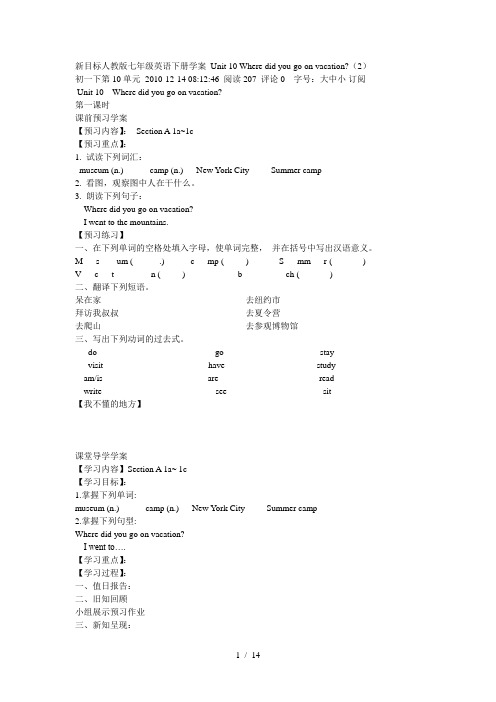
新目标人教版七年级英语下册学案Unit 10 Where did you go on vacation?(2)初一下第10单元2010-12-14 08:12:46 阅读207 评论0 字号:大中小订阅Unit 10 Where did you go on vacation?第一课时课前预习学案【预习内容】:Section A 1a~1c【预习重点】:1. 试读下列词汇:museum (n.) camp (n.) New York City Summer camp2. 看图,观察图中人在干什么。
3. 朗读下列句子:Where did you go on vacation?I went to the mountains.【预习练习】一、在下列单词的空格处填入字母,使单词完整,并在括号中写出汉语意义。
M___s____um ( .) c___mp ( ) S___mm___r ( )V___c___t____ ____n ( ) b____ _____ ch ( )二、翻译下列短语。
呆在家___________________ 去纽约市___________________拜访我叔叔___________________ 去夏令营___________________去爬山___________________ 去参观博物馆___________________ 三、写出下列动词的过去式。
do------ go------ stay------visit------ have------ study------am/is------ are------ read------write------ see------ sit------【我不懂的地方】课堂导学学案【学习内容】Section A 1a~ 1c【学习目标】:1.掌握下列单词:museum (n.) camp (n.) New York City Summer camp2.掌握下列句型:Where did you go on vacation?I went to….【学习重点】:【学习过程】:一、值日报告:二、旧知回顾小组展示预习作业三、新知呈现:Task1:引入新知识。
unit 10 where did you go on vacation 教案(人教新目标七年级) (6)
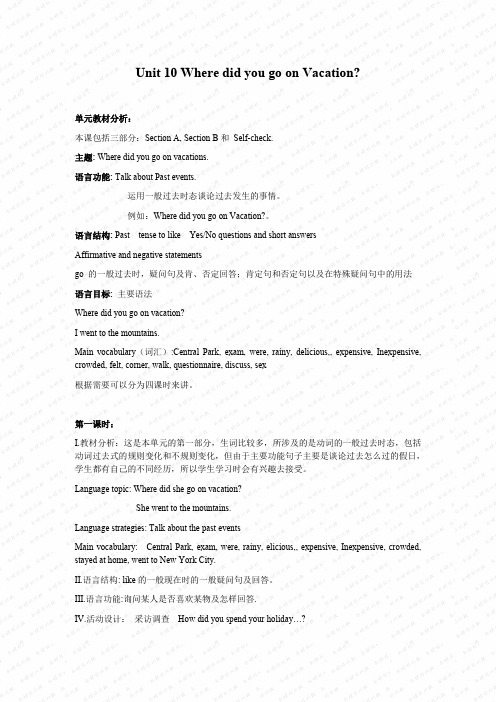
Unit 10 Where did you go on Vacation?单元教材分析:本课包括三部分:Section A, Section B和Self-check.主题: Where did you go on vacations.语言功能: Talk about Past events.运用一般过去时态谈论过去发生的事情。
例如:Where did you go on Vacation?。
语言结构: Past tense to like Yes/No questions and short answersAffirmative and negative statementsgo 的一般过去时,疑问句及肯、否定回答;肯定句和否定句以及在特殊疑问句中的用法语言目标:主要语法Where did you go on vacation?I went to the mountains.Main vocabulary(词汇):Central Park, exam, were, rainy, delicious,, expensive, Inexpensive, crowded, felt, corner, walk, questionnaire, discuss, sex根据需要可以分为四课时来讲。
第一课时:I.教材分析:这是本单元的第一部分,生词比较多,所涉及的是动词的一般过去时态,包括动词过去式的规则变化和不规则变化,但由于主要功能句子主要是谈论过去怎么过的假日,学生都有自己的不同经历,所以学生学习时会有兴趣去接受。
Language topic: Where did she go on vacation?She went to the mountains.Language strategies: Talk about the past eventsMain vocabulary: Central Park, exam, were, rainy, elicious,, expensive, Inexpensive, crowded, stayed at home, went to New York City.II.语言结构: like的一般现在时的一般疑问句及回答。
Unit10-Where-did-you-go-on-vacation英文说课稿

Unit10 Where did you go on vacation?Good morning, ladies and gentlemen. My name is Deng Qianzhen。
I am a junior student from School of Foreign Languages of Gannan Normal University。
I have learnt the necessities of being a teacher, including knowledge and teaching skills。
Today,I will talk about Unit10Wheredid you go on vacation? Go for it Junior English Book. There are six periods to finish this unit。
I will talk about the first period with the following ten parts。
I.Teaching philosophy:According to the New English Curriculum Criterion, teacher should play as a guider and let the students play a more important role in class。
So I design this class with the purpose to let the students be the center of the class。
As the students are junior students,so this lesson will be more focused on the students' ability of communication such as speaking and listening。
七年级英语 Unit 10 Where did you go on vacation 人教新目标版
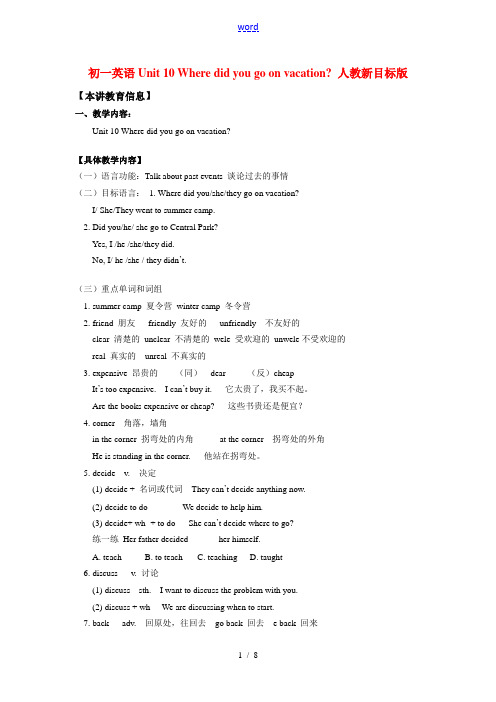
初一英语Unit 10 Where did you go on vacation? 人教新目标版【本讲教育信息】一、教学内容:Unit 10 Where did you go on vacation?【具体教学内容】(一)语言功能:Talk about past events 谈论过去的事情(二)目标语言:1. Where did you/she/they go on vacation?I/ She/They went to summer camp.2. Did you/he/ she go to Central Park?Yes, I /he /she/they did.No, I/ he /she / they didn’t.(三)重点单词和词组1. summer camp 夏令营winter camp 冬令营2. friend 朋友friendly 友好的unfriendly 不友好的clear 清楚的unclear 不清楚的wele 受欢迎的unwele不受欢迎的real 真实的unreal 不真实的3. expensive 昂贵的(同)dear (反)cheapIt’s too expensive. I can’t buy it. 它太贵了,我买不起。
Are the books expensive or cheap? 这些书贵还是便宜?4. corner 角落,墙角in the corner 拐弯处的内角at the corner 拐弯处的外角He is standing in the corner. 他站在拐弯处。
5. decide v. 决定(1) decide + 名词或代词They can’t decide anything now.(2) decide to do We decide to help him.(3) decide+ wh- + to do She can’t decide where to go?练一练Her father decided ______ her himself.A. teachB. to teachC. teachingD. taught6. discuss v. 讨论(1) discuss sth. I want to discuss the problem with you.(2) discuss + wh- We are discussing when to start.7. back adv. 回原处,往回去go back 回去 e back 回来n. 背部,后面,后部in/ at the back of…在……后面at the back of the house(反) in front of / in the front of8. the Great Wall 长城He who does not reach the Great Wall is not a true man.不到长城非好汉。
七年级英语新目标下册unit10 Where did you go on vacation

nfriendly 8.The dog didn’t let me in. It was u________to me. oney 9.I didn’t have any m_______ for a taxi, so I walked back to the hotel. playing 10.We had great fun __________(play) football. to go 11.Jim decided ____________(go) to Shanghai. 12.Mary found her brother ________(sit) in the sitting corner. (to) find 13.Let me help you ________(find) him. 14.Her story made us _________(feel) sad. feel
了
3.make sb. do sth. 让/使某人干某事 The movie makes me relaxing. 4.let / have sb. do sth. do前不带to. Let the boy do his homework alone . 5.feel+ adj. 感到... I feel hungry / tired /happy / excited 6.decide to do sth. 决定干某事 They decided to go to Hainan on vacation .
我们学英语有很多乐趣 . 2. find sb. doing sth. 发现某人在干某事 . find sb. do sth. 发现某人干过某事 I find him reading the novel (小说).我看见 小说) 小说 我看见
Unit-10-where-did-you-go-on-vacation

2. be lost
3. help sb. do sth.
丢失,失踪, 迷路
帮助某人做某事
4. make sb. do sth.
5. decide to do sth.
使得某人……
决定去做某事
6. till
直到……
2. Read about Maria’s vacation. Then circle the correct answers.
Wednesday, July 17th Today the weather was cool, so we decided to play tennis. We played all morning.It was really fun. We had Sichuan food for dinner. It was delicious!
at the words and the faces in the box. Then ask and answer, make a short conversation.
Great!
Delicious! Crowded! Interesting!
Expensive! Friendly!
3. 用所给词编对话。
She went to the mountains. He went to New York City. She stayed at home. He visited his uncle.
4. Fill in the blanks in the conversation. Use “was” or “were”.
Maria had a wonderful vacation. She went to Hawaii. Maria likes fruit, and the Hawaiian bananas and oranges were great.The weather was very good, too. On Monday she went to the beach and visited four museums. The museums were interesting and not very crowded. On Tuesday she went to the mountains. On Wednesday she visited an old friend. They went to the movies Wednesday evening.the movie was very funny. The vacation cost $5000, but Maria had a wonderful time.
- 1、下载文档前请自行甄别文档内容的完整性,平台不提供额外的编辑、内容补充、找答案等附加服务。
- 2、"仅部分预览"的文档,不可在线预览部分如存在完整性等问题,可反馈申请退款(可完整预览的文档不适用该条件!)。
- 3、如文档侵犯您的权益,请联系客服反馈,我们会尽快为您处理(人工客服工作时间:9:00-18:30)。
Unit 10 Where did you go on vocation?
111 Middle school Wang Chunhong
Section A The first period
Teaching Aims and Demands
1. Knowledge Objects
Key vocabulary :summer camp,New York City,museum,fantastic,unfriendly 。
Target language
Where did Tina go on vocation?
She went to the mountains.
Did she go to the mountains ?
Yes, she did。
No she didn`t。
2.Ability Object
Train students’ listening, speaking, reading and writing skills.
Train students’ communicative competence.
3. Moral Object
If you have some difficulties in talking about past events, don’t worry. Practice more, and you’ll make great progress sooner or
later.
Ⅱ. Teaching Key Points
Key words
The target language
Learn to use the activities in 1a.
Learn to talk about past events using the target language. Ⅲ. Teaching Difficulties
Train students’ listening, and speaking skills.
Learn to talk about past events using the target language.
Ⅳ. Teaching Methods
Scene teaching method.
Listening and oral practice methods.
Ⅴ. Teaching Aids
A tape recorder
A computer
Ⅵ. Teaching Procedures
StepⅠGreeting
T:How are you today ?How is the weather today ?
How was the weather yesterday ?(Ask the students to answer my questions quickly。
)
Step 2 Brain storming
1.How was your weekend ?
2.What did you do last weekend ?
Step 3 lead-in
(Show my own photos on the screen)
T:Where did I go on vacation ?I went to Yunnan on vacation,I went to lijiang ,
I took many photos there 。
Where did you go on vacation ?(ask them to answer)
S:I went to 。
on vacation 。
A:Where did you go on vacation ?
B:I went to 。
/visited/stayed。
Ask them to practice in pairs then in open pairs one by one。
Step 5 New words learning
1.Show pictures one by one and learn new words and verb phrases 。
Each picture shows something a person or persons did in the past 。
Then ask the students to name each activity.
2.Let`s chant ,look at the screen and speak the chant loudly。
Step 6 Practice
1.1a,Match the activites with the pictices。
2.Listen and answer the questions and then fill in the table 。
3.Check the answers
Step 7 Group work
Talk about your vacation activities in groups。
Using the sentences below。
Where did you /they/he/she go on vacation ?
I went to the summer camp
They/He/She/ visited museums
Did they/she/he go to the mountains?
Yes ,you/I/she/ he did 。
No,I didn`t。
Step 8 practice
Fill in the blacks in the conversations。
Use “was
“‘were“(screen,3a
Step 9 Do a survey。
Talk about your unforgetful vacation 。
Then give a report to us。
(give every student a table,first do a survey then give
a report )
Example:
My friend Tom went to Shanghai last weekHe went to
the zoo . He saw many animals there. It was great He was very happy
Homework ;Vacation Album。
Make a photo album of vacations you enjoyed 。
show
The album to your classmates and talk about your vacatio-ns 。
Blackboard design:
Unit 10 Where did you go on vocation?
summer camp,New York City, Where did Tina go on vocation?
She went to the mountains.
museum,fantastic,unfriendly Did she go to the mountains ?
Yes, she did。
No she didn`t。
